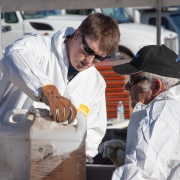
Of the total, Missouri was allocated $41 million to help fund diesel engine replacement projects across the state.
Over the past fiscal year, more than $7 million has gone toward replacing diesel school buses, public transit buses and other diesel trucks owned by local governments across the state. In that time, 83 schools submitted applications for more than 150 school bus replacements. The department awarded a total of $4.7 million to those projects, generally on a cost-sharing basis. While most awards equaled 25% of a new bus' cost, because of need, several schools qualified for awards equaling the full replacement cost.
School districts are using the VW funding to replace aging diesel buses with newer buses, which emit less nitrogen oxide. Together, this should reduce diesel nitrogen oxide emissions by more than 120,000 pounds, which will make these buses safer for young riders and the environment.
The effort has also created an unforeseen additional benefit. Some school districts donated their old buses to local fire departments for training. Dexter, Bradleyville, Hillsboro and Joplin school districts donated 10 buses for rescue training at the University of Missouri Fire and Rescue Training Institute. The donations allowed more than 100 firefighters to get valuable training to bolster local emergency service capabilities.
The remainder of Missouri’s VW Trust allocation went to city and county governments for truck replacement projects that otherwise would have been too expensive. These trucks provide crucial community services, but maintaining aging diesel vehicle fleets is expensive. By replacing old vehicles with cleaner ones, local governments can serve their communities in a more cost-effective manner. Some local governments and school districts chose to replace their diesel vehicles with alternative fuel vehicles, which require less maintenance and whose fuel is less expensive, allowing these organizations to devote those funds to serve their constituents in other ways.
To further reduce diesel-related emissions in Missouri, the department soon will accept applications under additional funding categories. The new categories will include switcher locomotives, tugboats and ferries, airport ground support equipment, cargo handling equipment and privately owned diesel trucks.



